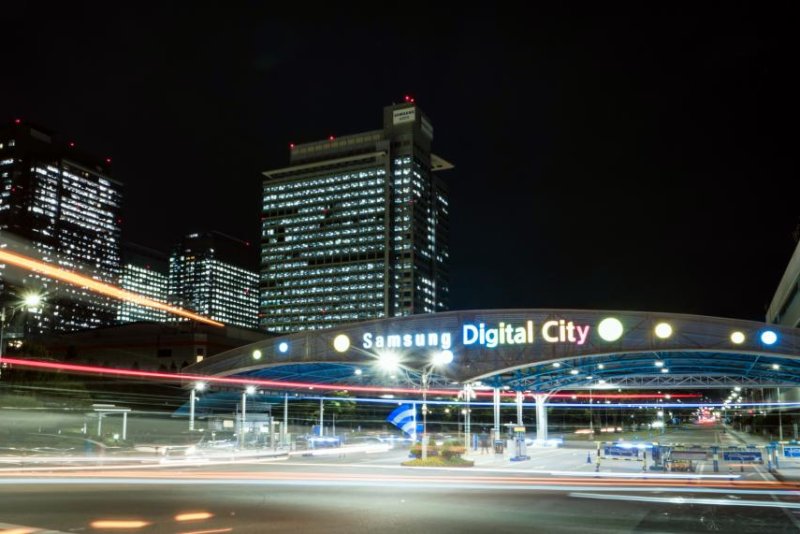1 of 2 | Samsung Electronics on Thursday announced plans to attain carbon neutrality, including joining the RE100 group of global corporations aiming for 100% renewable energy by 2050. Photo courtesy of Samsung
SEOUL, Sept. 15 (UPI) -- Technology giant Samsung Electronics announced a $5 billion green strategy Thursday that aims to ramp up renewable energy and cut out fossil fuels in order to achieve net zero carbon emissions by 2050.
The world's largest chip maker said its consumer electronics division, which manufactures mobile devices and televisions, will reach the net zero goal by 2030, while global operations including memory chips and semiconductors will hit the 2050 target.
Samsung said it will invest roughly $5 billion by 2030 in environmental initiatives that include reducing process gases, conserving water, expanding electronic waste collection and reducing pollutants.
The company also plans to introduce new technologies such as ultra-low power memory chips to reduce energy consumption in consumer electronics and aims to have 100% of the plastic in its products use recycled resin.
"The climate crisis is one of the greatest challenges of our time," Han Jong-hee, vice chairman and CEO of Samsung Electronics, said in a statement. "The consequences of inaction are unimaginable and require the contribution of every one of us, including businesses and governments."
Samsung Electronics also said Thursday that it has joined RE100, a group of global corporations committed to pursuing 100% renewable energy.
The company said it plans to meet the electric power needs of all international markets where it operates with renewable energy within five years -- except for its home country, where most of its production facilities are based.
Samsung called South Korea, where only 7.5% of electricity was generated from renewable sources in 2021, "one of the most challenging countries to source renewable energy."
"Procurement options for corporations have begun to expand but remain limited," the company said. "Additionally, the electric power needs of semiconductor manufacturing facilities have continued to increase with the expansion of Samsung Electronics' production capacity to meet global demand."
South Korea generated some 65% of its electricity from fossil fuels in 2021, and the administration of conservative President Yoon Suk-yeol recently backtracked from the renewable energy targets set by his predecessor, Moon Jae-in.
In the country's latest roadmap, the government said it would aim for 21% of the overall energy mix to come from renewables in 2030 -- a significant step down from the previous target of 30%.
Samsung itself has long faced criticism from environmental groups as well as investors for lagging behind global competitors in its climate commitments.
Dutch asset management firm APG praised Samsung's decision to join the RE100 after a lengthy period of indecision.
"Samsung Electronics had delayed making a clear commitment in terms of meaningfully reducing carbon emissions," Park Yoo-Kyung, APG's Asia-Pacific head of responsible investment and governance, said in an emailed statement. "This has been a growing concern for long-term investors, such as APG, for many years and we are pleased by this positive development."
Park said Samsung's commitment will provide a "significant boost" in spurring the growth of renewable energy in South Korea's electricity market, but expressed concern about the direction being taken by the current administration.
"We are concerned about how the government plans to reconcile the industry's desperate need for clean electricity to stay relevant in the long run, with its latest decision to back track its earlier commitment," he said.
Others said Samsung still needs to do much more to mitigate its climate impact.
"[Samsung's] belated effort is not ambitious enough," Jude Lee, deputy executive director of Greenpeace East Asia, said in an emailed statement.
"A 2050 target puts Samsung far behind many of its peers, including Apple, Sony, and Intel," Lee said. "In addition, Samsung has yet again limited its climate commitment to its operations and has left out any specific plans for supply chain decarbonization. Samsung doesn't seem to learn from the dire climate impacts that have affected the global supply chain."
Apple, a key client of Samsung, has committed to being 100% carbon-neutral across its entire supply chain by 2030.
Samsung Electronics was the third largest private greenhouse gas emitter in South Korea in 2020, according to Greenpeace.















